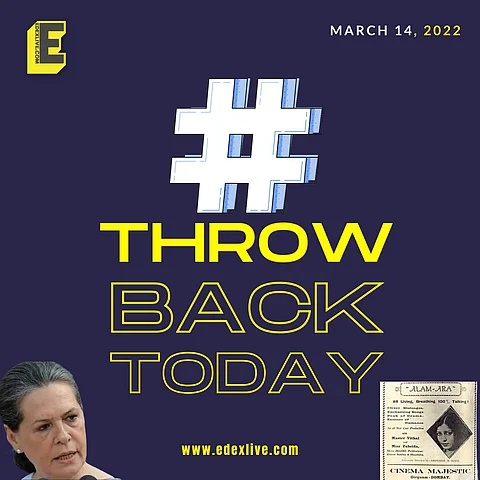

The election results of five states were out last week. There have been several victors and losers in the game, but one party that lost everywhere was the grand-old Indian National Congress (INC). Political analysts believe that this election has set the tone for the next general elections, with the entry of the Aam Aadmi Party in Punjab, and that it can be looked at as yet another turning point in Indian politics. But why are we talking politics now? This day marks the anniversary of one such turning point in India's political history.
On March 14, 1998, Sonia Gandhi was elected as the Congress president. This one event carried with it the tragedy of the past. After her husband and the former Prime Minister Rajiv Gandhi was assassinated in 1991, the Congress workers turned to Sonia to be part of the party.
While Sonia Gandhi rejected the plea for years, it was in 1997 that she decided to join politics and became a primary member of the grand old party at its Kolkata plenary. Soon after that, she was elected as the Congress president but that was short-lived.
Now, here's why this event also laid the foundation for Indian politics as we know it today. Apart from playing a role in the workings of its party, it also paved the way for the Sharad Pawar-led Nationalist Congress Party (NCP). After assuming the role of Congress president, Sonia resigned a year later on May 15, 1999, just before the Lok Sabha elections. The move came after Pawar, and two other INC members, PA Sangma and Tariq Anwar opposed the decision of her being projected as the party’s prime ministerial candidate on the grounds of her foreign origin. In her resignation, she proclaimed India as her motherland and said the country is "dearer to me than my own life." The resignation was not taken well by the Congress workers and protests erupted, after which, she agreed to take the resignation back and rejoin the Congress.
This escalated the tensions between the party and the rebels which led to the expulsion of Pawar, Sangma and Anwar. The trio started NCP and while Sangma and Anwar eventually went back to INC, Pawar became the face of NCP. Today, NCP is in alliance with INC and Shiv Sena in Maharashtra.
Talking movies
Enough politics. Let's talk films. India's first sound film Alam Ara (The Ornament of the World) was released on March 14, 1931. It was written, produced and directed by Ardeshir Irani. The film was made in the language called Hindustani, which is a mixture of Urdu and Hindi. Urdu by itself continued to play a role in retro Bollywood films but as time went by, it started disappearing (the question to ponder upon then is if anything can really be apolitical). However small-sized it may be, Urdu, or a mixture of Hindi and Urdu, continues to hold a place in Bollywood even today with lyricists like Javed Akhtar, Gulzar and even young ones like Kausar Munir and Irshad Kamil.
Coming back to Alam Ara, Indian cinema's first talking and singing film, was a super hit at the time. The theatre Majestic Cinema in Bombay was overpacked to a point that the police had to be called for. Tickets were sold in black for four to five rupees. It had a young actor named Zubeida and a Marathi stunt star Master Vithal as the leads. The villain was Prithviraj Kapoor, the patriarch of the Kapoor dynasty as we know it today. What is also interesting is that this film had six songs in total and one of them was sung by Irani's neighbourhood watchman, Wazir Muhammad Khan. While this was a one-off event for Khan, it is noteworthy that the industry at the time was welcoming of talent from across sections. Here's what will pinch a lot of cinema buffs reading this: You will never be able to watch this film. No copy of this film exists.
